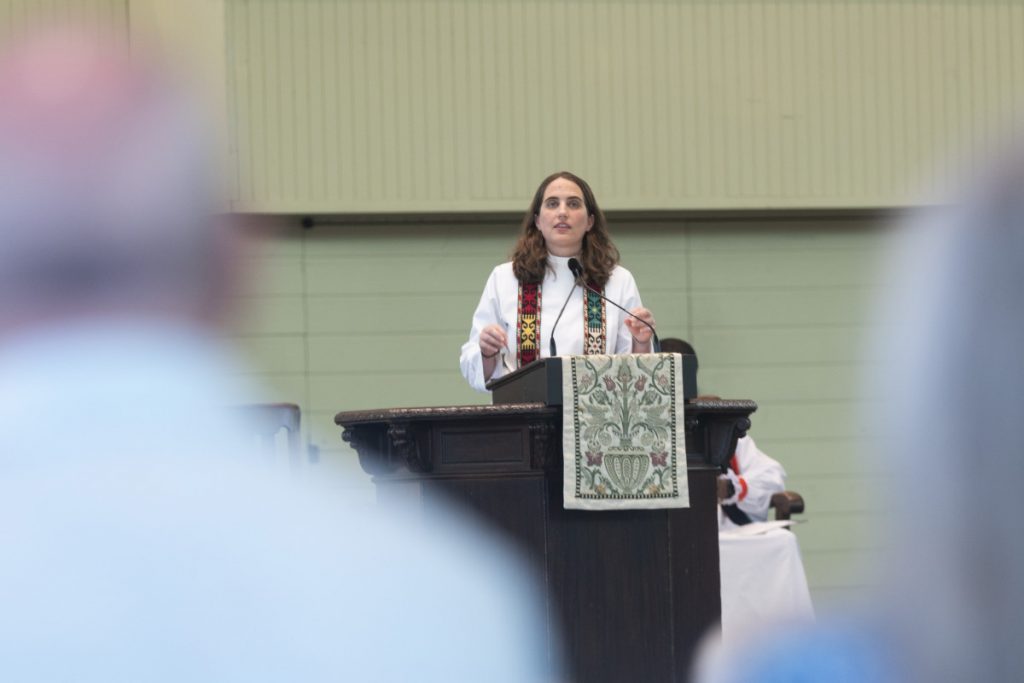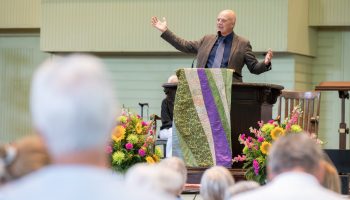
The Rev. Leyla King preaches Sunday the Amphitheater.
The Gospel of John is a text rich in symbolism. It begins not with a birth narrative or a genealogy, but a hymn, said the Rev. Leyla King at the 9:15 a.m. Wednesday morning service of worship in the Amphitheater.
The title of her sermon was “Grace like Grits,” and the scripture reading was John 3:9-21, the story of Nicodemus coming to Jesus at night.
King said light and darkness are used as symbols throughout this scripture reading. Nicodemus comes to Jesus in darkness because he is not ready to reveal his discipleship.
Jesus used the symbols of light and dark to answer Nicodemus’ questions. Jesus told Nicodemus in verses 3:19-21, “… the light has come into the world, and people loved darkness rather than light, because their deeds were evil. For all who do evil hate the light and do not come to the light, so that their deeds may not be exposed. But those who do what is true come to the light.”
King said that Jesus was not judging but speaking in poetry, and the center of his message was in verse 3:17, “… God did not send the Son into the world to condemn the world, but in order that the world might be saved through him.”
Human beings do not control this light, she said, which is good news as it is not up to us to decide on whom the light shines. The whole cosmos has been saved by God through the light. The only control humans have is where they position themselves in that light.
King is Palestinian-American, and her family had to flee from British colonial forces in Palestine. But ironically, she said, she turned to the dances of the British to unpack what John’s story means.
She is happily married to an Englishman and they enjoy BBC crime dramas and period pieces. What she likes about the period pieces is they almost always have at least one formal ball.
At these balls, couples pair off and dance with very prescribed, very formal movements. Couples come forward and then move apart, dance in lines and then with each other, all in a very British way.
King sees these movements as ways humans react to the light that God sends into the world. The light is always stable, but humans move closer or further away. The light, our partner, stays stable no matter how much humans decide to move. Even though we move away to love the darkness, Jesus still is talking about light.
Humans assume that the light and darkness are opposites, she said, but really they are only separate in degrees. Bright light and deep darkness are different degrees of light. Humans are always in relation to the light in some way.
How close or how far from the light we are depends on how much we trust in God’s grace, King said. God’s grace is poured out for all. Faith helps us trust in God so we receive grace and have the courage to dance.
As an illustration, she talked about having breakfast at Cracker Barrel. One time she ordered a “healthy” breakfast of a muffin, yogurt and fruit. The waitress brought a small bowl of grits. King said she did not order grits. The waitress said, “Honey, the grits just come.”
That is great news, King told the congregation: Grace is like grits — it just comes. There is no need to order grace or pay for it. God’s light shines for all the world, so all the world is saved. We can receive grace gratefully through faith.
King noted that John 3: 16 — that God so loved the world that he gave his only son that whoever believes in him will have everlasting life — is often put on billboards or is seen at football games. She said that verse 16 is only understood in light of verse 17, that God sent the Son into the world to save it, not condemn it.
What Jesus says in these verses about grace shows God’s desire for us to live in God. God’s light shines for all, whether we turn away from it or leap toward it. How much we dance in that light, she said, depends on how much we believe it is there for us.
It is God’s grace, not our leap, that redeems the world. She told the congregation that we are just a small step from a lighter space. We are never cast away from that light, because we are already partners with God.
The Rev. George Wirth, a retired Presbyterian minister, presided. Melissa Spas, vice president for religion at Chautauqua, read the scripture. The prelude was “Nicht zu schnell,” from Six Canonic Studies, by Robert Schumann, played on the Massey Memorial Organ by Owen Reyda, 2024 organ scholar. The Motet Choir sang “Tomorrow shall be my dancing day,” by John Gardner. The choir was under the direction of Joshua Stafford, director of sacred music and the Jared Jacobsen Chair for the Organist, accompanied by Reyda on the Massey Organ and by Rachel Stuart and Jim Johnson on tambourine. The postlude was “Lebhaft,” from Schumann’s Four Sketches for Pedal Piano, played by Stafford on the Massey Organ. Support for this week’s services and chaplaincy is provided by the Alison and Craig Marthinsen Endowment for the Department of Religion.




